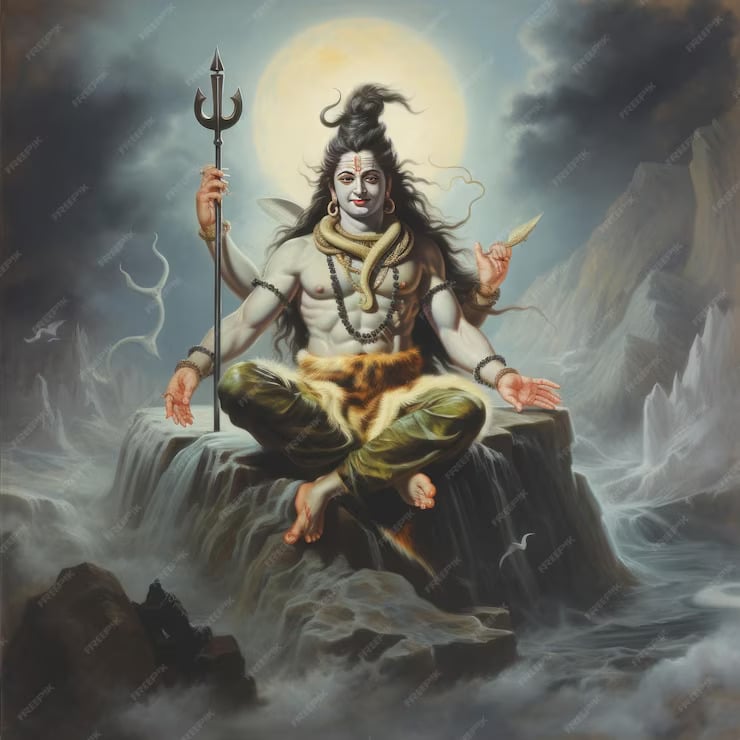
Spirituality
108 Names of Lord Shiva-Part 3
Imagine trying to describe something that has no beginning and no end – that’s Lord Shiva for you. It’s like trying to fit the universe into a single word or even a thousand words. People who love and worship Shiv have always faced this challenge. How do you capture the enormity of something so eternal in just a name or even many names?
But here’s the fascinating part – Lord Shiva is beyond counting. There are endless names for him. And here’s the beauty of it all – he’s easily pleased. It doesn’t matter which name his devotees call him by; he responds to each one with the same boundless love. In this blog series, let’s dive into the simplicity and depth of Lord Shiva’s 108 names, each revealing a piece of the timeless divinity that goes beyond what our minds can grasp. Join us on this journey as we explore the mystical realm of Lord Shiva and uncover the profound meanings behind his countless names.
55) Maheshwara: Lord of Gods – Being the Lord of Gods, Shiva holds the highest divine authority, guiding and protecting the celestial beings in the cosmic order.
56) Nagabhushana: One who has serpents as ornaments – With serpents as ornaments, Shiva symbolizes mastery over the primal life force, representing the transcendence of earthly desires and temptations.
57) Nataraja: King of the art of dancing – As the King of the art of dancing, Shiva’s cosmic dance symbolizes the rhythmic cycles of creation, preservation, and dissolution, harmonizing the cosmic energies.
58) Nilakantha: The Blue-throated one – Being the Blue-throated one, Shiva’s throat turned blue by consuming the cosmic poison, symbolizing self-sacrifice for the welfare of the universe.
59) Nitya Sundara: Ever beautiful – As ever beautiful, Shiva radiates eternal beauty and grace, captivating the hearts of his devotees with divine charm.
60) Nritya Priya: Lover of Dance – Being the Lover of Dance, Shiva revels in the joyous expression of cosmic rhythms, inviting his devotees to participate in the divine dance of creation.
61) Omkara: Creator of AUM – As the Creator of AUM, Shiva represents the primal sound of the universe, guiding his devotees towards the essence of divine vibrations and cosmic harmony.
62) Palanhaar: One who protects all – Being the One who protects all, Shiva offers unwavering protection and shelter to his devotees, ensuring their safety and well-being.
63) Panchatsaran: Vigorous – As Vigorous, Shiva embodies boundless vitality and strength, symbolizing the dynamic force that propels the cosmic cycles.
64) Parameshwara: First among all gods – Being First among all gods, Shiva holds the highest divine status, representing the supreme authority and transcendental nature of the cosmic order.
65) Paramjyoti: Greatest splendor – As the Greatest splendor, Shiva radiates divine brilliance, illuminating the cosmos with the supreme light of spiritual splendor.
66) Pashupati: Lord of all living beings – Being the Lord of all living beings, Shiva governs the welfare of every creature, symbolizing compassion and guardianship over the diverse forms of life.
67) Pinakin: One who has a bow in his hand – With a bow in his hand, Shiva symbolizes the cosmic force of destruction, annihilating negativity and obstacles in the spiritual journey of his devotees.
68) Pranava: Originator of the primal sound of AUM – As the Originator of the primal sound of AUM, Shiva signifies the essence of the universe, guiding his devotees towards the source of cosmic vibrations and universal consciousness.
69) Priyabhakta: Favorite of the devotees – Being the Favorite of the devotees, Shiva holds a special place in the hearts of those who seek his divine love and guidance, responding to their devotion with boundless affection.
70) Priyadarshana: Of loving vision – As the one of loving vision, Shiva perceives the world with compassionate eyes, inspiring his devotees to cultivate a vision of love and understanding.
71) Pushkara: One who gives nourishment – Being the One who gives nourishment, Shiva provides spiritual sustenance and divine wisdom, nurturing the growth of his devotees on the path of enlightenment.
72) Pushpa lochana: One who has eyes like flowers – With eyes like flowers, Shiva symbolizes the gentle and nurturing gaze that brings forth blossoms of spiritual awakening and divine grace.
73) Ravi lochana: Having Sun as the eye – As the one having the Sun as the eye, Shiva signifies the radiant and illuminating vision that dispels darkness and ignorance, guiding his devotees towards enlightenment.
74) Rudra: The Roarer – Being The Roarer, Shiva’s powerful roar symbolizes the primal sound of creation, instilling awe and reverence in the hearts of his devotees.
75) Sadashiva: The Transcended One – As The Transcended One, Shiva embodies the state of eternal bliss and supreme consciousness, guiding his devotees towards transcendence beyond the material world.
76) Sanatana: The Eternal God – Sanatana portrays Shiva as the timeless and everlasting deity, existing beyond the constraints of time and space, embodying the eternal essence of divinity.
77) Sarvacharya: The Supreme Teacher – Sarvacharya represents Shiva as the ultimate guide and instructor, imparting profound spiritual teachings to illuminate the path of wisdom and enlightenment.
78) Sarvashiva: The Eternal Lord – Sarvashiva signifies Shiva as the perpetual and unchanging Lord, showcasing divine constancy and everlasting authority over the cosmic realms.
79) Sarvatapana: Preceptor of All – Sarvatapana portrays Shiva as the nurturing protector and mentor of all beings, offering guidance and shelter to those who seek his divine refuge.
80) Sarvayoni: Always Pure – Sarvayoni embodies Shiva’s inherent purity, symbolizing an untainted and unsullied nature that remains constant amidst the complexities of existence.
81) Sarveshwara: Lord of All – Sarveshwara signifies Shiva’s universal sovereignty, asserting his dominion over every aspect of creation and highlighting his role as the supreme ruler.
That concludes our exploration of the next 27 amongst 108 divine names of Lord Shiva. Remember, regardless of the name you invoke, Lord Shiva responds with utmost love, devotion, selflessness, and pure intentions. Approach him like a child calling their mother, and may your connection with Lord Shiva deepen, bringing blessings and spiritual fulfillment into your life.
Har Har Mahadev!!!
Please subscribe to our mailing list to stay connected and receive spiritual information. In case of any queries, please write to us at info@chamundaswamiji.com. You can check out our YouTube channel Chamunda Swamiji where you can learn Tantra, Mantra, Yantra, and Meditation from His Holiness Shri Chamunda Swamiji. If you seek to learn Shakti Kriya, please register with us, and we will get back to you.
Post a Comment
-
Subscribe to Our Blog
-
Categories
-
Popular Articles
- Dead moth in the house. What universe is trying to tell you?
- Spiritual Meaning of Moth
- Vivah Bandhan Curse – What Is It and How to Spiritually Heal It.
- The Dasa Mahavidyas
- What are Beej Mantras?
- Tripura Sundari | The Dasa Mahavidya
- Maa Bhuvaneshwari | The Dasa Mahavidyas
- The Five Shades of Tantra
- Ramakrishna Paramhansa – The Man who almost became a Woman
- Maa Chinnamasta | The Dasa Mahavidyas



